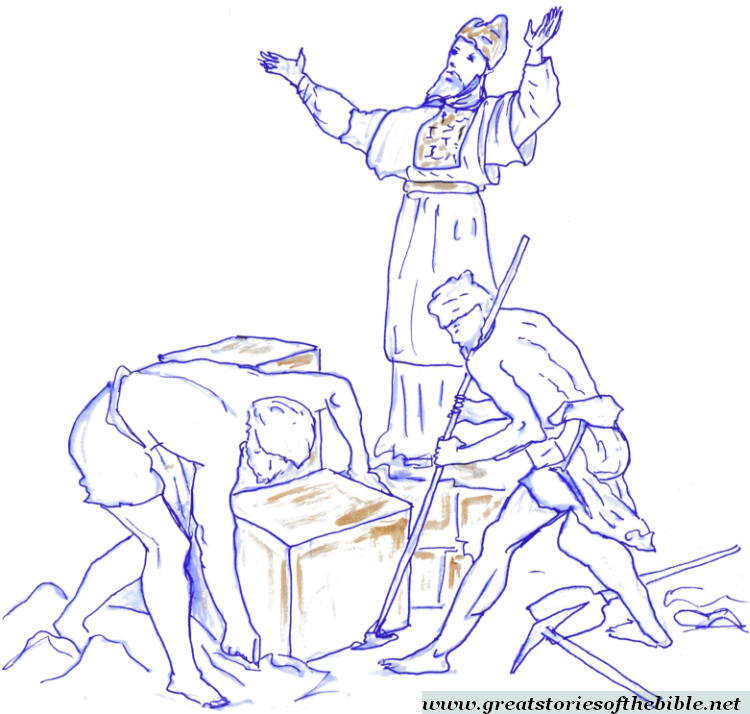Ezra and Nehemiah
The joy of the Lord is your strength
The Hebrew people was exiled in Babylon because of their sins. They lost all: the kingdom of Judah, the Promised Land and the Temple (destroyed by Nebuchadnezzar in 587 BC). Only one thing remains: the Lord’s Word that drove them out from Egypt and consecrated them, the Word that led them through the wilderness and gave them a land to dwell, the Word that finally cursed them for their infidelity and sent them in exile. The Lord’s Word, however, includes the promise of a free forgiveness, giving them «a new heart and a new spirit» (see Ezek 36,26 and Jer 31,33). The Word of the covenant goes seeking the dispersed and discouraged people to open a new future after the punishment. «When you will be in oppression, in the future days all these Words will find you and you shall return to the LORD your God, and listen to his voice: for the LORD your God is a merciful God; he will not fail you, neither destroy you, nor forget the covenant of your fathers which he swore to them» (Deut 4,30-31). The exile prophets, after having warned the people against their sin, console them and announce the long-awaited return to home. They are the Second Isaiah (chapters 40 to 55 of the Book of Isaiah) and Ezekiel the priest .
In the Christian Bible to the Books of Kings follow the Books of Chronicles, which tell many of the facts already examined in previous Books with a few additions and a marked pro-Judean perspective. For example, they almost ignore the story of the northern kingdom of Israel; they are silent about David’s sin with Bathsheba and about Solomon’s idolatry, while they are very attentive to the Temple and the worship practice. To the same author (or authors) are attributed the Books of Ezra and Nehemiah, which continue the people’s story with their return to Jerusalem. We are in 538 BC and to Babylon’s power succeeded the Persians’ one. «Now in the first year of Cyrus king of Persia, that the word of the LORD by the mouth of Jeremiah might be accomplished, the LORD stirred up the spirit of Cyrus king of Persia, so that he made a proclamation throughout all his kingdom, and put it also in writing, saying, “Thus says Cyrus king of Persia, ‘The LORD, the God of heaven, has given me all the kingdoms of the earth; and he has commanded me to build him a house in Jerusalem, which is in Judah. Whoever there is among you of all his people, may his God be with him, and let him go up to Jerusalem, which is in Judah, and build the house of the LORD, the God of Israel (he is God), which is in Jerusalem. Whoever is left, in any place where he lives, let the men of his place help him with silver, with gold, with goods, and with animals, besides the freewill offering for God’s house which is in Jerusalem.’” Then the heads of ancestral houses of Judah and Benjamin, and the priests, and the Levites, even all whose spirit God had stirred to go up rose up to build the house of the LORD which is in Jerusalem. All those who were around them strengthened their hands with vessels of silver, with gold, with goods, and with animals, and with precious things, besides all that was willingly offered. Also Cyrus the king brought forth the vessels of the house of the LORD, which Nebuchadnezzar had brought out of Jerusalem, and had put in the house of his gods […]. When the seventh month had come, and the children of Israel were in the cities, the people gathered themselves together as one man to Jerusalem. Then Jeshua the son of Jozadak stood up with his brothers the priests, and Zerubbabel the son of Shealtiel and his brothers, and built the altar of the God of Israel, to offer burnt offerings thereon, as it is written in the law of Moses the man of God».

Among various vicissitudes and with Prophet Haggai and Zechariah’s encouragement (see Ezra 5,1 and following), they rebuild and consecrate the Temple in 515 BC. The community’s reorganization is entrusted «to Ezra the priest, the scribe, even the scribe of the words of the commandments of the LORD, and of his statutes to Israel» and to Governor Nehemiah, who reconstructs Jerusalem’s walls. The people’s language is no more Hebrew, but Aramaic; therefore, to understand the proclamation of the Lord’s Law they need a translation. The synagogue, intended as a meeting place in which the people can proclaim and comment on the sacred texts, was probably born in exile, where the Temple sacrifices cannot take place. The Levites «read in the book, in the law of God, distinctly; and they gave the sense, so that they understood the reading. Nehemiah, who was the governor, and Ezra the priest the scribe, and the Levites who taught the people, said to all the people, “This day is holy to the LORD your God. Do not mourn, nor weep.” For all the people wept, when they heard the words of the law. Then he said to them, “Go your way. Eat the fat, drink the sweet, and send portions to him for whom nothing is prepared; for this day is holy to our Lord. Do not be grieved; for the joy of the LORD is your strength.”». The people repudiate their foreign wives and the children born to them, renewing the commitments of the covenant: prohibition of mixed marriages, respect for the Sabbath, offerings to the Temple and all the other orders of the Law. Israel’s new challenge will be their meeting with Greek culture (IV century BC onwards). Before telling about it, though, we will follow the biblical book order reading Tobit, Judith and Esther.